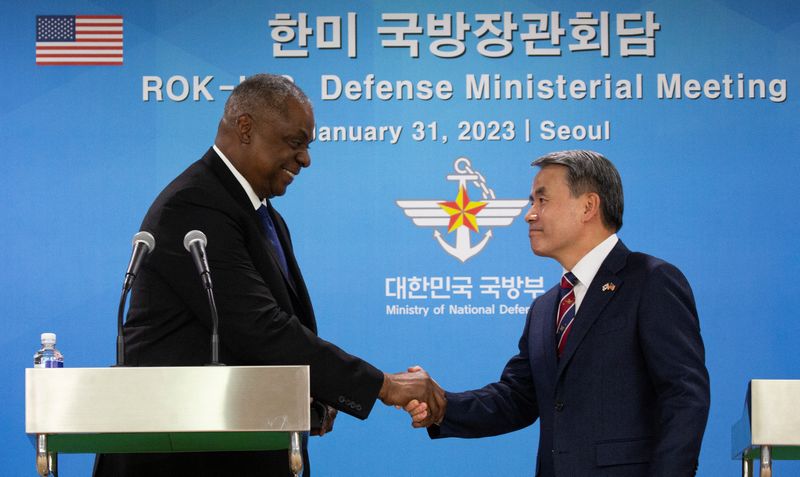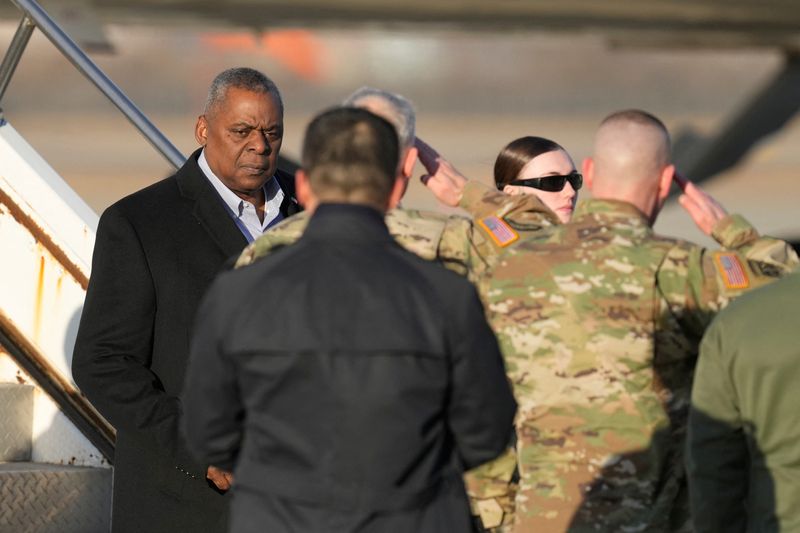By Hyonhee Shin
SEOUL (Reuters) - The defence chiefs of the United States and South Korea vowed on Tuesday to expand military drills and boost nuclear deterrence planning to counter North Korea's weapons development and prevent a war.
U.S. Defense Secretary Lloyd Austin was in Seoul for talks as Washington seeks to reassure a key Asian ally over its nuclear commitment amid growing threats from North Korea.
Austin met South Korean Defence Minister Lee Jong-sup, following their annual security talks in Washington in November, and was set to meet President Yoon Suk-yeol before flying to the Philippines.
"In order to realise peace through strength on the Korean peninsula, we pledged to expand the scale and elevate the levels of the combined exercises and training," Lee told a joint news conference.
The latest meeting of the two came as South Korea pushes to bolster confidence in American extended deterrence - its military capability, especially nuclear forces, to deter attacks on its allies.
Austin said his trip aimed to deepen co-operation on tackling shared security challenges and reaffirm the U.S. commitment to South Korea as "ironclad" at a time of heightened tension and provocation.
"The United States stands firm in its extended deterrence commitment that includes the full range of U.S. defence capabilities, including our conventional, nuclear and missile defence capabilities," he told the conference.
Meeting with Austin later, South Korean President Yoon Suk-yeol stressed the need for discussions between the allies to evolve an effective and powerful system of extended deterrence, so helping to dispel the concerns of the South Korean people.
"North Korea's nuclear threats continue to escalate day by day," Yoon added, according to a statement from his office.
Nuclear-armed North Korea launched an unprecedented number of missiles last year, including intercontinental ballistic missiles (ICBMs) capable of reaching the U.S. mainland.
Officials from both the United States and South Korea have also warned Pyongyang could be preparing for its first test of a nuclear device since 2017.
The North's evolving threats have revived calls from some politicians and experts in South Korea to bring back U.S. tactical nuclear weapons or even a South Korean nuclear programme, though Seoul officials dismissed such a possibility.
In a joint statement, the defence chiefs added that they had also committed to expand this year's combined military exercises, and deploy more U.S. strategic assets, such as aircraft carriers and bombers.
NUCLEAR DRILLS
More than 28,500 American troops are stationed in South Korea as a legacy of the 1950-1953 Korean War, which ended in an armistice, rather than a peace treaty.
Pyongyang has denounced the joint drills as proof of the allies' hostile intentions, and has staged its own military shows of force.
Lee has said the two countries will hold nuclear tabletop exercises in February in a scenario of North Korean nuclear attacks, as they move to improve joint nuclear planning and implementation and boost information sharing.
Austin said the table-top exercises would ensure that the allies saw "eye-to-eye" on their response to North Korea.
The exercises are in line with the allies' talks to expand extended deterrence activities and mechanisms on the peninsula and in the region, he added.
South Korea has faced growing pressure to join U.S.-led efforts to counter the rising influence of China, and help Ukraine battle Russia.
While visiting Seoul on Monday, NATO Secretary-General Jens Stoltenberg urged South Korea to increase military support to Ukraine.

He cited other nations that have changed their policy of not providing weapons to countries in conflict following Russia's invasion.
Asked about Stoltenberg's comments, Lee said he was monitoring the situation but declined to elaborate on any military support for Ukraine.
